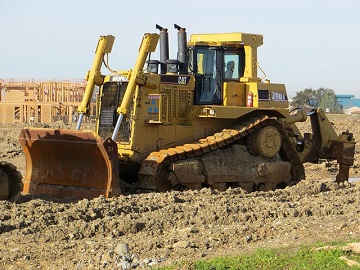Plant acquisition
Contents |
[edit] Introduction
The term ‘plant’ refers to machinery, equipment or apparatus used for an industrial activity. Typically In construction, ‘plant’ refers to heavy machinery and equipment used during construction works.
Construction plant is generally re-useable, and so, as well as being purchased new, it may be purchased second hand or hired. The Construction Plant Hire Association suggest that, ‘The UK plant hire industry is the best established and most professional in the world, and is worth over £4 billion to the UK economy.’
However, many contractors prefer to hire only those plant items which are required to meet peak demand or specialist activities. The decision to purchase plant out-right needs to be carefully weighed up, since it must then be operated at an economic utilisation level to produce a profitable rate of return on the investment.
In other words, the more down time (time when the plant is standing idle) there is, the less value it is providing for the company, and the lower the return on their investment. However, a business may believe that by purchasing and owning outright a plant asset, they will attract more of a specific kind of work and therefore increase business.
There are a number of issues to be considered before purchasing plant:
- Whether the plant will provide an adequate rate of return on the capital employed?
- Can the company obtain the plant through some other means or it is necessary to own it outright?
- Is there the potential of hiring the plant out to others?
- Will it be possible to sell the plant on when it is no longer required?
- What are the maintenance, repair and transport costs associated with using the plant?
- Can it be securely stored when not in use?
- Will finance be necessary?
- Are there options for hire purchase or leasing?
[edit] Cash or outright purchase
This means that the plant may be paid for immediately at the time of purchase. On the company’s balance sheet it will provide a tangible asset. Whether or not this is the most profitable method of investing will depend on the company having the liquid assets required to make the purchase, and being sure that the level of return from the investment is sufficient to make it worthwhile.
[edit] Hire purchase
This involves a contract between the company and a supplier of finance. The company agrees to pay a specific 'rent' during the contract period. The title of the asset may transfer to the company at the end of this period for a previously agreed sum. While this option doesn’t require a large amount of up-front capital on the part of the company, it can involve high rates of interest.
[edit] Leasing
In this case, the title does not pass to the lessee, instead, there is a contract that states the company can obtain the use of a plant asset which is owned by the lessor in return for specified rent payments. The two forms of lease appropriate for acquiring construction plant are:
[edit] Finance lease
Arrangement with a financial institution, where the rental charges cover the asset’s capital cost, in addition to a service charge.
[edit] Operating lease
Arrangement with the manufacturers or suppliers of the asset. This can be a good option where complex plant is being used that requires skilled personnel to operate and service it.
[edit] Find out more
[edit] Related articles on Designing Buildings Wiki
Featured articles and news
A case study and a warning to would-be developers
Creating four dwellings... after half a century of doing this job, why, oh why, is it so difficult?
Reform of the fire engineering profession
Fire Engineers Advisory Panel: Authoritative Statement, reactions and next steps.
Restoration and renewal of the Palace of Westminster
A complex project of cultural significance from full decant to EMI, opportunities and a potential a way forward.
Apprenticeships and the responsibility we share
Perspectives from the CIOB President as National Apprentice Week comes to a close.
The first line of defence against rain, wind and snow.
Building Safety recap January, 2026
What we missed at the end of last year, and at the start of this...
National Apprenticeship Week 2026, 9-15 Feb
Shining a light on the positive impacts for businesses, their apprentices and the wider economy alike.
Applications and benefits of acoustic flooring
From commercial to retail.
From solid to sprung and ribbed to raised.
Strengthening industry collaboration in Hong Kong
Hong Kong Institute of Construction and The Chartered Institute of Building sign Memorandum of Understanding.
A detailed description from the experts at Cornish Lime.
IHBC planning for growth with corporate plan development
Grow with the Institute by volunteering and CP25 consultation.
Connecting ambition and action for designers and specifiers.
Electrical skills gap deepens as apprenticeship starts fall despite surging demand says ECA.
Built environment bodies deepen joint action on EDI
B.E.Inclusive initiative agree next phase of joint equity, diversity and inclusion (EDI) action plan.
Recognising culture as key to sustainable economic growth
Creative UK Provocation paper: Culture as Growth Infrastructure.






















